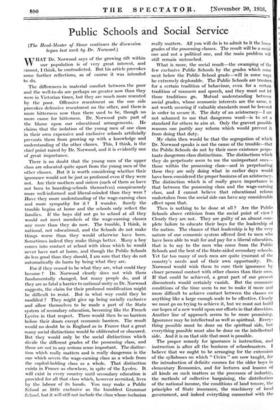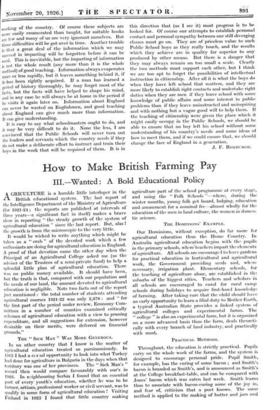Public Schools and Social Service
(The Head-Master of Stowe continues the discussion begun last week by Dr. Norwood.) WWHAT Dr. Norwood says of the growing rift within our population is of very great interest, and V cannot, I think, be contradicted. But his article provokes some further reflections, as of course it was intended to do.
The differences in material comfort between the poor and the well-to-do are perhaps no greater now than they were in Victorian times, but they are much more resented by the poor. Offensive resentment on the one side provokes defensive resentment on the other, and there is more bitterness now than there used to be, though no more cause for bitterness. Dr. Norwood puts part of the blame upon our educational arrangements. He claims that the isolation of the young men of one Moss in their own expensive and exclusive schools artificially prevents them from growing up with a knowledge and understanding of the other classes. This, I think, is the chief point raised by Dr. Norwood, and it is evidently one of great importance.
There is no doubt that the young men of the upper class are educated quite apart from the young men of the other classes. But it is worth considering whether their ignorance would not be just as profound even if they were not. Are their mothers and sisters (such of them as have not been to boarding-schools themselves) conspicuously more well-informed and liberal-minded than they were ? Have they more understanding of the wage-earning class and more sympathy for it ? I wonder. Surely the trouble begins at home and the sehools only reflect the families. If the boys did not go to school at all they would not meet members of the wage-earning classes any more than they do now. The trouble, I think, is national, not educational, and the Schools do not make things worse than they would otherwise have been.
Sometimes indeed they make things better. Many a boy comes into contact at school with ideas which he would never have met at home, and though the Public Schools do less good than they should, I am sure that they do not automatically do harm by being what they are.
For if they ceased to be what they are, what could they become ? Dr. Norwood clearly does not wish them fundamentally changed, but many people do, and if they are as fatal a barrier to national unity as Dr. Norwood suggests, the claim for their profound modification might be difficult to resist. But in what way could they be modified ? They might give up being socially exclusive and allow themselves to be made a part of the State system of secondary education, becoming like the French Lycees in that respect. There would then be no barriers before their doors except economic barriers. The result would no doubt be in England as in France that a great many social distinctions would be obliterated or obscured. But they would only be the social distinctions which divide the different grades of the possessing class, and those are not in any serious sense important. The distinc- tion which really matters and is really dangerous is the one which severs the wage-earning class as a whole from the capital-holding class as a whole. That distinction exists in France as elsewhere, in spite of the Lycges. It will exist in every country until secondary education is provided for all that class which, however recruited, lives by the labour of its hands. You may make a Public School as little exclusive as the humblest Grammar School. but it will still not include the class whose inclusion really matters. All you will do is to admit to it the lower grades of the possessing classes. The result will be a social one and not a political one, and the main problem will still remain untouched. - What is more, the social result—the swamping of the few exclusive Public Schools by the grades which come next below the Public School grade—will in some ways be extremely deplorable. The Public Schools are trustees, for a certain tradition of behaviour, even for a certain tradition of manners and speech, and they must not let those traditions go. Mutual understanding between social grades, whose economic interests are the same, is not worth securing if valuable standards must be lowered in order to secure it. The duty of an aristocracy—I am not ashamed to use that dangerous word—is to set a standard for others to aim at. Only the gravest possible reasons can justify any reform which would prevent it from doing that duty.
My claim then would be that the segregation of which Dr. Norwood speaks is not the cause of the trouble—that the Public Schools do not by their mere existence perpe- tuate dangerous class distinctions. The distinctions which they do perpetuate seem to me the unimportant ones— those within the possessing class—and in perpetuating these they are only doing what in earlier days would have been considered the proper business of an aristocracy. The distinction which is of really grave importance is that between the possessing class and the wage-earning class, and I cannot believe that educational reform undertaken from the social side can have any considerable effect upon that.
Then is nothing to be done at all ? Are the Public Schools above criticism from the social point of view ? Clearly they are not. They are guilty of an almost com- plete failure to educate their boys for the leadership of the nation. The chance of that leadership is by the very nature of our economic system offered first to men who have been able to wait for and pay for a liberal education, that is to say to the men who come from the Public Schools and the best of the State-aided secondary schools. Yet far too many of such men are quite inorant of the country's needs and of their own opportunity. Dr. Norwood would wish them to cure their ignorance by. closer personal contact with other classes than their own. If that could be achieved, a great part of our present discontents would certainly vanish. But the economic conditions of the time seem to me to make it more and more difficult to achieve contact between the classes on anything like a large enough scale to be effective. Clearly we must go on trying to achieve it, but we must not build our hopes of a new world upon our efforts in that direction. Another line of approach seems to be more promising. Ignorance may be intellectual as well as spiritual. Every- thing possible must be done on the spiritual side, but everything possible must also be done on the intellectual side. And it is on that side that most is possible.
The proper remedy for ignorance is instruction, and instruction is after all the business of schoolmasters. I believe that we ought to be arranging for the extension of the syllabuses on which " Civics " are now taught, for the introduction of definite courses for the. older boys in elementary Economics, and for lectures and lessons of all kinds on such. matters as the processes of industry, the methods of collective bargaining, the distribution of the national income, the conditions of land tenure, the principles of State insurance, the machinery of local government, and indeed everything connected with the working of the country. Of course these subjects are more easily enumerated thari taught, for suitable books are few and many of us are very ignorant ourselves. But those difficulties will be got over in time. Another trouble is that a great deal of the information which we may succeed in imparting will be forgotten before it can be used. This is inevitable, but the imparting of information is not the whole result (any more than it is the whole method) of good teaching. Information always evaporates more or less rapidly, but it leaves something behind it, if irdhas. been rightly acquired. If a man has learned a period of history thoroughly, he may forget most of the facts, but the facts will have helped to shape his mind, and in any case he will always be at home in the period if he visits it again later on. Information about England can never be wasted on Englishmen, and good teaching about England can give much more than information. It can give understanding.
It is easy to say what schoolmasters ought to do, and it may be very difficult to do it. None the less, I am convinced that the Public Schools will never turn out the leaders and servants which the country needs if they do not make a deliberate effort to instruct and train their boys in the work that will be required of them. It is in this direction that (as I see it) most progress is to be looked for. Of course our attempts to establish personal contact and personal sympathy between our still diverging classes must go on. They are of priceless value to such Public School boys as they really touch, and the results which they achieve are in quality far superior to any produced by other means. But there is a danger that they may always remain on too small a scale. Clearly the two methods must support each other, but I think we are too apt to forget the possibilities of intellectual instruction in citizenship. After all it is what the boys do when they have left school that matters, and they are more likely to establish right contacts and undertake right duties when they are men if they leave school with some knowledge of public affairs and some interest in public problems than if they leave uninstructed and uninquiring and with nothing but a vague good will to help them. If the teaching of citizenship were given the place which it might easily occupy in the Public Schools, we should be able to ensure that no boy left his school without some understanding of his country's needs and some ideas of how to meet them, and if we could ensure that, we should change the face of England in a generation.
J. F. ROXBURGH.































































 Previous page
Previous page